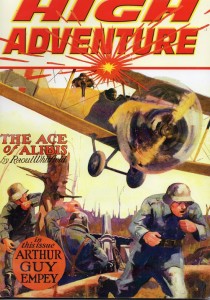Magazine Review: High Adventure #138 Battle Stories edited by John P. Gunnison
By the mid-1920s, the Great War was far enough in the past for people in America to be nostalgic about it, and the pulp magazines noticed an increase of interest in stories about the war. So they started putting out magazines dedicated to the subject, starting with War Stories in 1925. While the majority of stories were about the ground war, stories about the pioneer pilots and dogfights were extremely popular, so they got spun off into their own aviation pulps.
Most of the stories in this issue are from Battle Stories, published by Fawcett.
“The Ace of Alibis” by Raoul Whitfield: Lieutenant “Windy” Cummings has had a series of mysterious plane problems that require him to land well before his craft would be in danger of combat. His fellow pilots are getting suspicious, and his gunner has requested a transfer. Windy’s new gunner is the commander, so this time he’ll need to show his steel. Or will he?
“When Gunmen Turned Soldiers” by Arthur Guy Empey: Two feuding gangsters find themselves drafted and assigned to the same unit. Worse, their new sergeant, “Porky” is a man they used to abuse as a gofer. The top sergeant spots the problem, and puts the crooks in their place, but they see their chance for revenge when the top’s son also joins the unit. When a plan to smear the boy as a coward is only partially successful, the gangsters decide more direct action is required.
“Raw Meat” by James Perley Hughes is the one War Stories reprint, which features the war exploits of three American recruits, a cowboy, a sheepherder and a “nester” (homesteader.) (This was diversity by 1920s standards.) The three quarrel constantly, with the cowboy and sheepherder in particular constantly accusing each other of cowardice. But they’re also the closest of friends, especially when defending their pets against the vile Lieutenant Skaggs. This one features a strong streak of classism. The battle-hardened veteran officer who’s worked his way up from the ranks is the scum of the earth, while the West Point graduates who’ve never seen battle before are honorable and wise.
“Phantom Bullets” by Harold F. Cruckshank is the tale, based loosely on real events, of a snipers’ duel between a German marksman and a Canadian First Nations soldier. There’s a bit of period stereotyping, both negative and positive, and the old “men must beat each other up to bond” scene. Still easily the best story in the issue.
“”Stand Fast, Contempibles” also by Harold F Cruckshank, tells the tale of the fighting retreat of the British Army across Belgium towards the beginning of the Great War. “Contemptible” was a slur aimed at the army under General French by the Kaiser. The men, stung to anger, took it as a nickname to throw it in his face. The main character is an American who inherited a farm in Belgium and joins the Contempibles when the Germans invade. The war becomes even more personal for him when he learns a German spy has murdered his son and plans to do the unthinkable to his Belgian wife. This story emphasizes the stereotype of Germans as inhuman monsters that was strongly featured in pulp stories before World War Two made it even more acceptable.
Naturally, all of these stories have scenes of violence, generally depicted as legitimate under the circumstances.
Recommended for war story fans who don’t mind old-fashioned moral certainty–Allies good, Germans bad.

